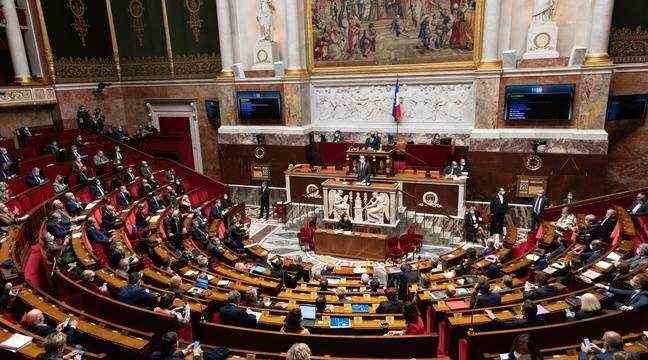National Assembly, illustration. – Jacques Witt / SIPA
After months of controversy, the law was finally voted. The Parliament adopted this Thursday noon the proposed ‘controversial law on “global security”, and in particular its article 24 rewritten but still penalizing the malicious dissemination of the image of the police.
This text defended by Gérald Darmanin, which has been the subject of strong contestation from the defenders of public freedoms, will probably have to pass under the caudine forks of the Constitutional Council before its promulgation.
Article 24 extensively rewritten
The left in any case promised it and Jean Castex had announced in November during the first examination of the text at the Palais Bourbon the referral of the wise men of the rue Montpensier on its article 24. History of trying to deflate the controversies around a proposal of law now rich in 70 articles but which ended up being summed up in its most controversial provision.
Disregarded on the left, denounced by journalists’ organizations but widely supported by police unions, article 24 aims to protect the police in operation by penalizing the malicious dissemination of their image. Going beyond militant circles, the protest was expressed in the street, sometimes with violence, against a background of societal debate around a police accused of increasing violent slippages.
The most important day of mobilization had gathered at the end of November between 133,000 and 500,000 people according to sources. The right-wing majority Senate has largely rewritten the “24” by creating in the Penal Code an offense of “provocation to identification”. There is no longer any reference to the 1881 law on freedom of the press. In line with what the upper house voted for, the parliamentarians meeting in a joint joint committee (CMP) approved this drafting on March 29 and renamed this text LREM “Global security law preserving freedoms”. “As the drafting of the Senate was going well for us, we were overwhelmed”, summarizes the LREM deputy Jean-Michel Fauvergue, co-editor with his colleague Alice Thourot.
“The municipal police will take off”
The government can say “thank you the Senate”, joked the leader of deputies LR Damien Abad, after the cacophony between the majority and the executive in December on the rewriting of the article. Sufficient, however, to deflate the protest? The coordination against the bill which brings together journalists’ unions and organizations for the defense of freedoms demanded Tuesday once again the withdrawal of this text. A press conference will be organized at noon near the Palais Bourbon. The text is not limited to its emblematic article 24, however. Its objective is to set the “security continuum” to music between state security forces, reinforced municipal police forces and a better structured private security sector. .
Certain ambitions on this last aspect have been planed. “There are major advances” but “it was also necessary to find a balance in order to be able to respect the freedom of entrepreneurship”, argues Alice Thourot. “With this law, the municipal police will take off and for private security, it is a founding text”, praises Jean-Michel Fauvergue. Expanded use of police pedestrian cameras, drones, the carrying of weapons for off-duty law enforcement officials or even the creation of a municipal police force in Paris: other measures continue to be a matter of debate.
A text to “throw in the trash” for LFI
The leader of the rebels Jean-Luc Mélenchon had judged that the whole of the text was to be “thrown in the trash”, when the boss of the RN Marine Le Pen, rather discreet on the merits of the measures, had voted the bill. At the first reading in the National Assembly in November, the level of protest among the “walkers” was high but far from the records: 30 LREM abstained and 10 voted against.
“I support the work on the safety continuum of my colleagues Fauvergue and Thourot, not that of Beauvau”, justifies Sacha Houlié for example. This “walker” of Vienna, who will not vote for the text on Thursday, believes that the controversial provisions for which the Minister of the Interior has held the pen “are not necessary”.

